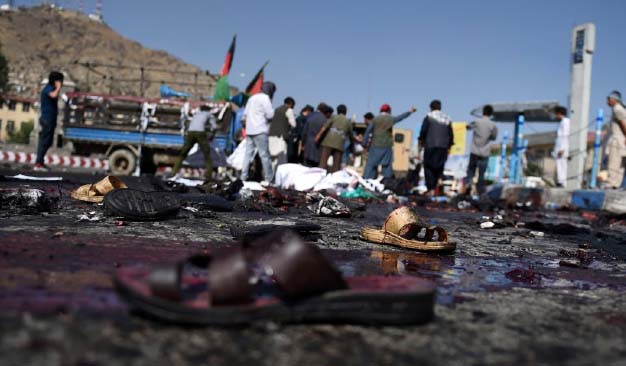It was one of the most shocking scene when the peaceful demonstrators on the streets of Kabul were brutally targeted by suicide bombers. Three attackers with suicide vests attacked the Hazara protestors who were raising their voice for changing Turkmenistan-Uzbekistan-Tajikistan-Afghanistan (TUTA) power project route through Bamyan. Two of the attackers blasted themselves among the protestors while the third one was killed by the security forces. The attack resulted in death of more than 80 people and injury to over 200 others and thus marked one of the most tragic incidents in Afghanistan’s recent history.
Islamic State of Iraq and Syria (ISIS) or Daesh claimed responsibility behind the horrific attack and said the group targeted a Shiite gathering in the city. This is the first time the terror group has claimed responsibility behind a large attack in capital Kabul as the loyalists of the terror group have been attempting to expand terrorist activities in Afghanistan. This comes at a time when the government and security authorities are of the opinion that the group is being controlled by them. This particular attack by Daesh clearly depicts its intentions and the authorities must do something really serious to control in true sense before it is able to target more innocent people on the basis of sect and ignite a sectarian clash within the country.
The incident was so tragic and heart-breaking that many countries and United Nations (UN) condemned it emphatically. UN called it a war crime; United Nation’s Assistance Mission in Afghanistan (UNAMA) chief Tadamichi Yamamoto said in a statement, “An attack deliberately targeting a large, concentrated group of civilians amounts to a war crime. This incident is an outrage that cannot be justified. It is an attempt to spread terror amongst civilians and stifle the freedoms that Afghans have sacrificed so much to obtain. The United Nations stands firmly with the people of Afghanistan as they seek to exercise their fundamental human rights.” Meanwhile, White House Press Secretary Josh Earnest said, “The United States condemns in the strongest terms the horrific attack in Kabul, which has left more than 80 dead and hundreds wounded… The heinous attack was made all the more despicable by the fact that it targeted a peaceful demonstration by members of the minority Hazara community… As we reaffirmed at the NATO Warsaw Summit, the US and the international community stand firm in our ongoing support for the people and government of Afghanistan.”
Beside condemnation, the top priority matter at the moment is to ensure that the wounded get proper treatment and health facilities. There should be efforts to find the true culprits behind the incident and they should be brought to justice. It has to be ensured that such peaceful and exemplary protests must be encouraged so that the democratic norms must be strengthened in the country and the protestors should be provided full-proof security every time they stage such protests.
Moreover, the Afghan government, particularly President Ashraf Ghani, needs to hear the voices of the protestors seriously regarding TUTAP. TUTAP is basically a 500 kV electricity power project, financed by Asian Development Bank (ADB) and is meant to transfer electricity from Turkmenistan, Uzbekistan, Tajikistan to Afghanistan.
From Afghanistan’s point of view this project is very much necessary in supporting the electricity infra-structure in the country and provide people with reliable electric energy throughout the year. This project can also support Afghanistan in realizing the promises of CASA-1000, as without TUTA Afghanistan cannot serve as transit system for transmitting electricity from Central Asian countries to South Asia because of the incapacity to export bulk of energy.
In an assessment in November 2015, Asian Development Bank (ADB) mentioned, “Afghanistan needs a unified national electricity grid. Different parts of Afghanistan’s networks are supplied as passive islands by power fed from Iran, Tajikistan, Turkmenistan, and Uzbekistan. Because of asynchronous grid operations in these countries, the current network configuration is highly inflexible.” TUTA will thus support in bringing these networks together and allow flexibility in supply and provide efficiency in load dispatch.
The project seems to be of immense importance but, unfortunately, it is facing a controversy because of its route. It has been, somehow, decided that the project would follow the route through Salang but there are many analysts, politicians and people who suggest that it had to pass through central Bamiyan province. The most notable among them is the German engineering consultancy – Fichtner, that suggested in 2013, in an assessment for ADB that Bamiyan route would avoid the narrow space and difficulties along the Salang Pass, would allow connecting further generation by coal fired power plants along the route and would secure power supply of Kabul and south Afghanistan by using a separate route.
Home » Opinion » Carnage in Kabul
Carnage in Kabul
| Dilawar Sherzai

